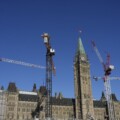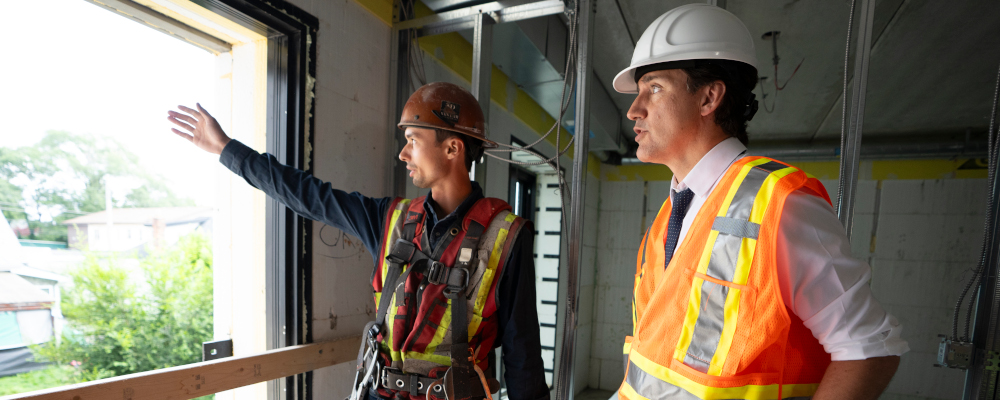The federal cabinet has now wrapped up its retreat in Charlottetown. Featured prominently on the agenda was how this government should respond to growing restlessness around Canada’s housing affordability crisis.
Of particular note was that economist Mike Moffatt was brought to PEI to advise the government on the issue. This is encouraging. Moffatt has emerged over the past couple of years as a leading voice advocating for increased housing supply. In preview of his address, he wrote a piece for The Hub this week in which he describes a recent report he co-authored calling for a “federal industrial strategy” to see as many as 5.8 million homes built by the end of 2030.
You can and should read the full report here.
To my delight, his piece went further than the report did in correctly identifying municipal zoning as the primary constraint on new housing supply.
Mike writes:
The federal government cannot alter municipal zoning codes, but it can offer incentives to do so. It could set up a set of minimum standards (call it a National Zoning Code), and any municipality that altered its zoning code to be compliant could be given one-time per-capita funding to spend on infrastructure construction and maintenance, no other strings attached.
This proposal echoes and expands on a recent policy proposal shared by Pierre Poilievere and the Conservative Party of Canada (CPC) to “require [that] cities seeking federal funds pre-approve building permits for high-density housing and employment on all available land surrounding transit stations”.
That is, it bridges the federal-municipal jurisdiction gap by having the feds tie cash transfers to land use liberalization.
The CPC has a separate policy proposal to “require [that] unaffordable big cities like Vancouver increase homebuilding by 15 percent annually or face big financial penalties and have portions of their federal funding withheld.”
Whether the Liberals will finally adopt any of these recommendations is another question. Ministers departed Charlottetown on Wednesday with no new announcements on housing. Neither did they offer any commitments to follow through on the expert advice they received.
In terms of how the government could make meaningful progress on this file that has been far too neglected for far too long, here are my thoughts:
No more ‘everything bagel’ policies
To be effective, any federal minimum standards—or National Zoning Codes, as Mike et al. might call them—will have to be kept very simple. The temptation will be to pair sensible liberalization measures with new requirements for improved accessibility, affordability, and energy efficiency. These must be resisted to avoid what Ezra Klein calls “Everything Bagel Liberalism,” which is the tendency that governments have to “add goals—many of them laudable—and in doing so, [add] obstacles, expenses, and delays”.
Ezra correctly identifies a pattern where governments ”[try] to accomplish so much within a single project or policy that [they] end up failing to accomplish anything at all”.
It is, however, worth noting that high-density development inevitably moves the needle on all of these laudable goals. Midrise and highrise buildings are generally more accessible than detached and semi-detached houses; building more housing makes more housing available to more people and places downward pressure on prices; and having more people living within large cities, where they could walk, cycle, or take transit to work is obviously great for the environment, not to mention their health. Further, per physicist Geoffrey West, a city of 1,000,000 people consumes 15 percent less energy in aggregate than two cities of 500,000 people each, and that relationship scales.
Carrots and sticks
Federal cash transfers, as carrot or stick, should be tied to inputs (like upzoning) and not outputs (like starts or completions).
Municipalities have direct control over their land use policies in a way that they don’t over housing starts and completions. The latter could, for example, be negatively impacted by rising interest rates, among other variables.
An effective strategy featuring cash transfers should also feature pro-supply rhetoric, to name and shame politicians who continue to prioritize the status quo. It would be much harder for a politician to defend foregoing federal dollars because they refuse to, say, eliminate minimum parking requirements than because of forces that they can argue are well outside of their control.
Given the Washington Monument syndrome, which refers to lower levels of government cutting the most visible or appreciated services they provide when faced with loss of funding from higher levels of government, you can imagine a future in which Toronto city councillors credibly blame a federal Conservative government for degraded local transit service.

Municipalities are key
Federal cash transfers on their own might not be attractive enough for municipal adoption of a desired policy change, as municipal mayors and councillors generally get elected and re-elected precisely on their willingness to oppose new development and intensification of so-called stable neighbourhoods.
And therein lies the rub with the federal-municipal jurisdiction gap. The levers available to the federal government might be more limited than we think. This is likely especially true with federal cash transfers as carrots. After all, municipalities could raise additional revenue themselves by approving more housing development and collecting more development charges.
I think that we’ll need a big stick to get municipalities to do the right thing.
As noted above, the naming and shaming of municipal politicians who continue to prioritize the physical character of their neighbourhoods over their potential dynamism, growth, and ability to house young and new Canadians will be necessary. The fight over new housing permissions is ultimately a fight for the future. The strategies and tactics proposed for that fight are critical and should be critically considered, as are the conviction and will of the fighter.
Recommended for You

The Notebook by Theo Argitis: Carney’s One Big Beautiful Tax Cut, and fresh budget lessons from the U.K.

Christopher Snook: Is Canada sleepwalking into dystopia?

Rudyard Griffiths and Sean Speer: The fiscal hangover from the One Big Beautiful Bill hits Canada

‘A fiscal headache for Mark Carney’: The Roundtable on how Trump’s One Big Beautiful Bill could affect Canada




